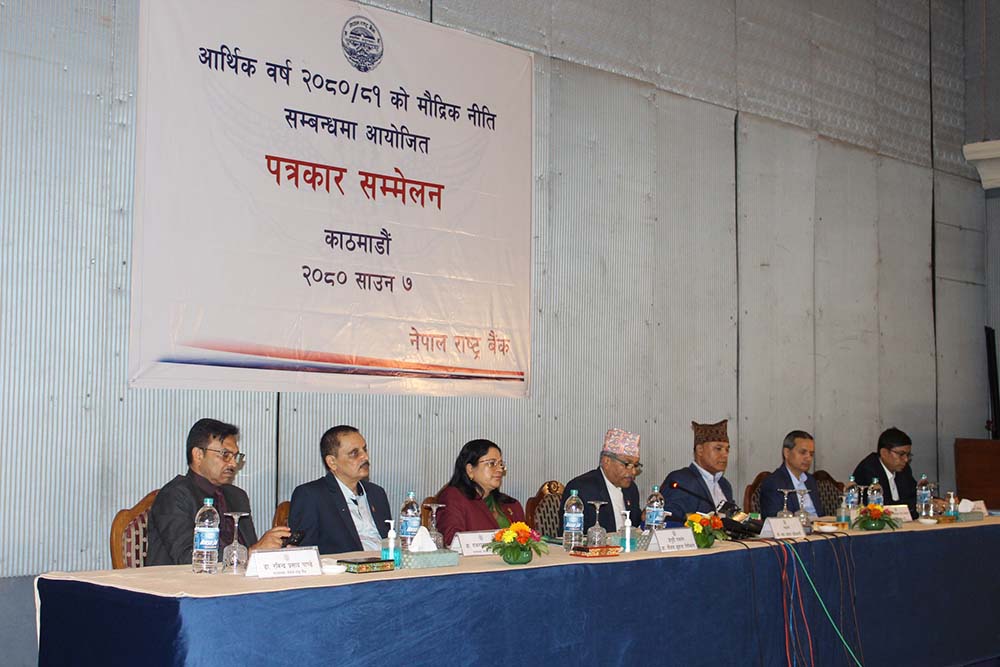
KATHMANDU: The private sector has realised that the monetary policy for the current fiscal year 2023/24 cannot solve the existing problems of the economy. Nepal Rastra Bank (NRB) unveiled the monetary policy on Sunday.
The private sector had expected that the monetary policy would come up with a solution to deal with existing problems of the national economy, including high interest rates, low demand, cash flow problems, low production and job cuts, declining morale of private sector and postponement of new investment plans. However, the policies adopted by the central bank through monetary policy do not seem to be helping to lift the economy out of recession.
The joint statement issued by the Federation of Nepalese Chambers of Commerce and Industry (FNCCI), Confederation of Nepalese Industries (CNI) and Nepal Chamber of Commerce (NCC) states that the effects of the arrangements made in the monetary policy cannot be ascertained without the publication of the guidelines. Although it is said that the central bank has carefully introduced a flexible monetary policy, the provisions in the monetary policy seem to be tight.
The monetary policy of the previous fiscal year had set a target of 12.6% for loans to the private sector, but this target has been reduced to 11.5% for the current fiscal year. This way, it will be difficult to achieve the 6% economic growth target set by the government through the budget.
The private sector had expected that the government would take initiatives to control the high interest rates through monetary policy. However, the central bank has reduced the policy rate by 0.5% while keeping the bank rate unchanged. This will not help in reducing the interest rate the statement said. The representative organisations of the private sector suggested the central bank use all tools to reduce the base rate of the bank through the guidelines.
According to organisations of private sector, loan loss arrangement of 1.3% made by banks and financial institutions (BFIs) should be maintained at 1%, and the industries or borrowers affected by the decrease in demand should be allowed to reschedule and restructure their loans with the agreement of the banks and borrowers, re-loan facilities should be provided and a minimum premium on interest should be kept. If the monetary policy does not address these suggestions, the economy will not be sustainable, the statement read.
As the monetary policy mentions that the working capital loans guidelines will be reviewed as per the demand of BFIs, if banks and businesspersons are allowed to decide on this, it will increase confidence in the market, the statement said.
The joint statement said that the private sector may be discouraged since the monetary policy states that separate guidelines will be issued to make the supervision of large borrowers effective.
The decision to increase the limit of the first residential home loan from Rs 15 million to Rs 20 million and the dollar exchange facility up to $2,500 is positive, said the representative organisations of the private sector. Likewise, the decision to reduce the risk burden of lending against shares, real estate and hire purchase loans is also positive.
Although the monetary policy is directed towards increasing the domestic production capacity by channelling the financial resources to the productive sector, it is not clear what facilities will be provided for the entire productive sector.
The monetary policy does not seem to be able to bring the programme that can increase the confidence of the private sector and make the economy vibrant, according to representative organisations of private sector.
READ ALSO:
- Investment from private sector will now increase: Finance Minister Mahat
- NRB unveils monetary policy for current fiscal year 2023/24
- Consumer price inflation remains at 6.83 pc in mid-June: NRB
- ‘Monetary policy should prioritise investment in productive sector’
- Government to bring monetary policy for FY 2023/24 next week
Published Date: July 25, 2023, 12:00 am
Post Comment
E-Magazine
RELATED B360 National


-1772534372.jpeg)

-1772527494.jpeg)
